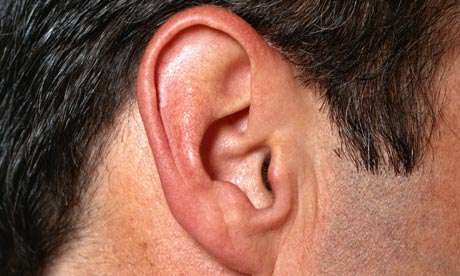
Tinnitus is a symptom rather than a condition, but it is not a trivial problem. An inquest heard recently how a 74-year-old man shot himself in the head after being tormented by "screaming in his ears" from tinnitus. Five days after the inquest, a study published in the Proceedings of the National Academy of Sciences said that tinnitus was caused by the blocking of a neurotransmitter (GABA) in the brain. This meant that a drug to boost GABA production could treat the condition.
What is it? The British Tinnitus Association (BTA) defines it as the perception of sound in the absence of any corresponding external sound. The word tinnitus comes from the Latin for ringing, and people hear noises (ringing, buzzing, whistling) in one or both ears, or in their heads. It can be acute or chronic, and tends to be more obvious when it's quiet – trying to sleep can be impossible. If you have pulsatile tinnitus, you hear noises in time with your pulse. Some people have low-frequency tinnitus, when they think they can hear humming from fridges or road noises – check if other people can hear the same noises; if they can it isn't tinnitus. About one in 10 people get tinnitus and it is a chronic, serious problem for about 1% of people. As well as the noises, it can cause fatigue, concentration problems, irritability and depression.
What causes it? Tinnitus is a symptom of an underlying condition, often one that has damaged the tiny hairs inside your inner ear that trigger nerve cells to transmit sound to the brain. When these delicate hairs are damaged, for example through natural hearing loss from ageing, an injury to the ear, or through blasting your ears with loud music (MP3 players are more culpable than loud concerts), the nerves transmit abnormal messages to the brain, which interprets them as sound. Other conditions can also cause tinnitus, such as otosclerosis (where the bones in the middle ear become stiff), a build-up of ear wax, middle-ear infections, a head injury and a perforated ear drum. Stress is known to make tinnitus worse but is unlikely to cause it on its own. Some medicines can cause tinnitus (anti-malaria drugs – but you shouldn't stop taking them), so check with your doctor.
What can be done about it? See your GP to rule out any treatable causes (build-up of wax, an infection or hearing loss that needs a hearing aid). The BTA has excellent information (helpline 0800 018 0527). The good news is that for most people the condition improves as the brain learns to tune out the signals. However, this can take a few long, lonely months, so joining a local support group is often helpful.
Some people find that noises that mask the tinnitus such as TV or a ticking clock can help. White-noise generators make comforting noises such as rainfall or wave sounds, and can be plugged into pillow speakers. Sleeping tablets are not advised because they are addictive.
How can you prevent it? If you work in an industry where there are loud noise levels, your ears should be protected. Reduce the amount of time you are exposed to loud noise and take regular breaks.
What about complementary therapies? The BTA says there is no evidence that they work. Save your money and have a massage to reduce your stress levels.

